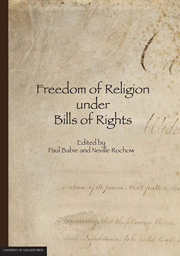Book contents
- Frontmatter
- Contents
- Acknowledgments
- List of Contributors
- Foreword by The Hon Sir Anthony Mason AC KBE: Human Rights and Courts
- INTRODUCTION
- SETTING THE SCENE
- CONTEMPORARY FREEDOM OF RELIGION ISSUES
- 5 Defamation and Vilification: Rights to Reputation, Free Speech and Freedom of Religion at Common Law and under Human Rights Laws
- 6 Should an Australian Bill of Rights Address Emerging International Human Rights Norms? The Challenge of ‘Defamation of Religion’
- 7 Christian Concerns about an Australian Charter of Rights
- 8 Apostasy in Islam and the Freedom of Religion in International Law
- COMPARATIVE EXPERIENCE WITH FREEDOM OF RELIGION
- TABLE OF LEGISLATION AND INTERNATIONAL INSTRUMENTS
- INDEX
6 - Should an Australian Bill of Rights Address Emerging International Human Rights Norms? The Challenge of ‘Defamation of Religion’
from CONTEMPORARY FREEDOM OF RELIGION ISSUES
Published online by Cambridge University Press: 05 June 2013
- Frontmatter
- Contents
- Acknowledgments
- List of Contributors
- Foreword by The Hon Sir Anthony Mason AC KBE: Human Rights and Courts
- INTRODUCTION
- SETTING THE SCENE
- CONTEMPORARY FREEDOM OF RELIGION ISSUES
- 5 Defamation and Vilification: Rights to Reputation, Free Speech and Freedom of Religion at Common Law and under Human Rights Laws
- 6 Should an Australian Bill of Rights Address Emerging International Human Rights Norms? The Challenge of ‘Defamation of Religion’
- 7 Christian Concerns about an Australian Charter of Rights
- 8 Apostasy in Islam and the Freedom of Religion in International Law
- COMPARATIVE EXPERIENCE WITH FREEDOM OF RELIGION
- TABLE OF LEGISLATION AND INTERNATIONAL INSTRUMENTS
- INDEX
Summary
The decision to draft a bill of rights heralds a momentous event in any country's history. In the latter half of the twentieth century, crafting a document that addresses the fundamental rights of individuals and groups and their relationship to the state has typically involved a flurry of public consultations, negotiations, drafting, and rewrites. Increasingly, however, such endeavours remain incomplete without some effort to observe, understand, and account for comparative trends related to human rights on the international level as well as in other states. Although writing about constitutions specifically, A E Dick Howard's observations are equally relevant to standalone bills of rights:
The international human rights revolution has had undeniable impact upon comparative constitutionalism. It is hard to imagine drafters of a new constitution going about their task unconcerned about human rights standards … For half a century, the Universal Declaration of Human Rights has served as a model for constitution makers. Countless constitutions written since 1948 contain guarantees that either mirror or draw upon the Declaration.
Numerous examples across a wide range of states confirm this tilt in favour of consulting international norms. Recent drafting efforts in Iraq, Afghanistan, New Zealand, South Africa, and all the states of the former Soviet Union and Warsaw Pact leap to mind, to name but a few. In each of these cases — and with varying degrees of success — national drafters held their country's unique cultural, historical, and political experiences up against the collective database of international experiences to divine commonalities, mutual priorities, shared aspirations, and points of divergence.
- Type
- Chapter
- Information
- Freedom of Religion under Bills of Rights , pp. 86 - 116Publisher: The University of Adelaide PressPrint publication year: 2012

